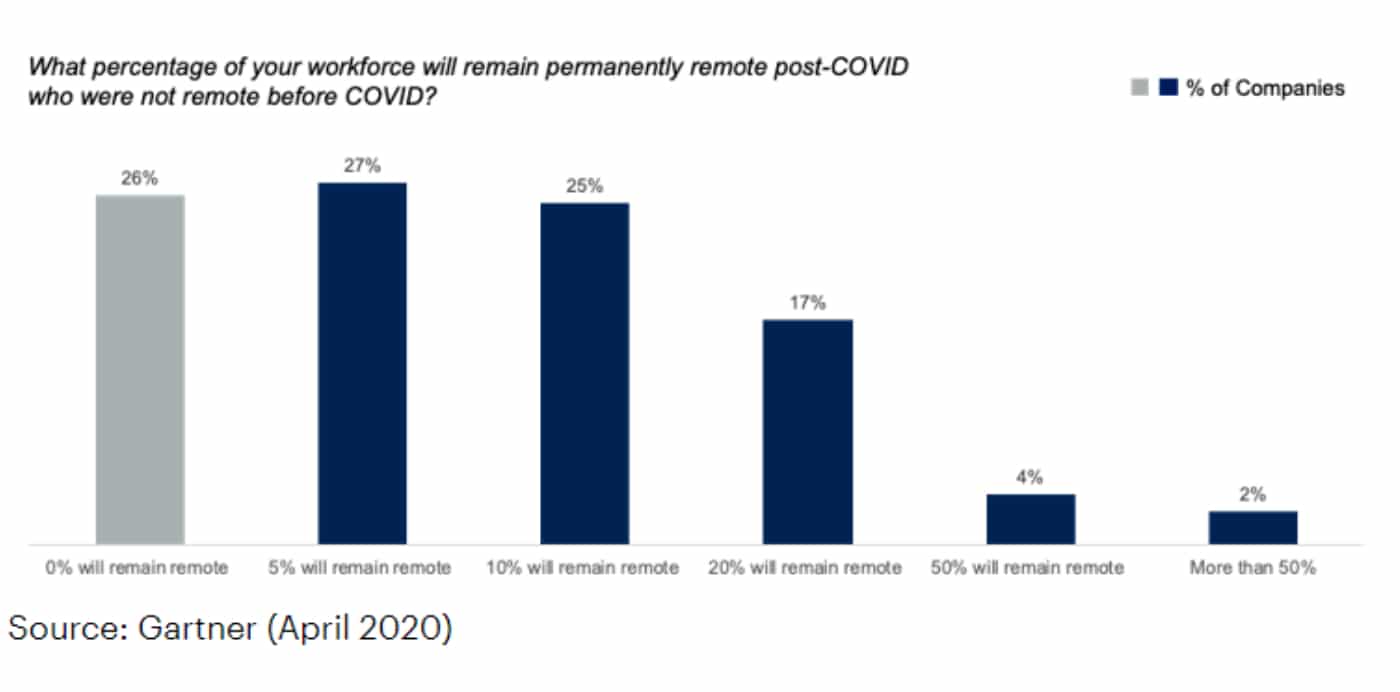According to a recent survey, a majority of business CFOs have indicated that their organizations will most likely continue with remote work initiatives after the pandemic concludes – it’s more cost-effective and more convenient. Is your business prepared for this new normal?
Ever since the Internet was adopted worldwide, remote work has been a possibility. A reliable phone line, a well-maintained business email account, and remote access to business data mean that an employee could be anywhere with an Internet connection and still get their work done.
But, for most of the professional world, remote work hasn’t been seriously considered until now. This global crisis has forced businesses to send their employees home and figure out how to keep them productive while they’re there.
According to 317 CFOs recently surveyed by Gartner, the business world may not change back when the pandemic is over:

What Benefits Does A Remote Work Model Offer?
Like all remote models supported by the cloud, hosting your data remotely and having your staff access it remotely delivers a number of key advantages when compared to the conventional in-office working model.
Advantages include:
If remote work is this popular and this cost-effective, why has it taken a crisis of this magnitude to reveal its potential?
Key Obstacles To Overcome With Remote Work
Only time will tell how many businesses continue with a remote work model in some form once the pandemic concludes. If nothing else, this has been a valuable opportunity to test the potential of the remote work for businesses that never would have otherwise.
Like this article? Check out the following blogs to learn more:
Microsoft Teams: How Will It Help Your Business During The Coronavirus Pandemic?
Remote Work Tech Tip: Are You Using A Virtual Private Network?
SBA Launches CARES Act – Is Your Business Eligible For Support During The Coronavirus Pandemic?
Call our business managed IT services department directly at (404) 777-0147 or simply fill out this form and we will get in touch with you to set up a getting-to-know-you introductory phone call.
Fill in our quick form
We'll schedule an introductory phone call
We'll take the time to listen and plan the next steps
11285 Elkins Rd Suite E1, Roswell, GA 30076
© Copyright 2024 Centerpoint IT. All Rights Reserved. Website in partnership with Tech Pro Marketing. | Privacy Policy
Get Immediate Help For All Your Technology Issues (404) 777-0147

If you want our team at Centerpoint IT to help you with all or any part of your business IT, cybersecurity, or telephone services, just book a call.
Fill in your information below to get started today.
"*" indicates required fields
Fill in your information below to schedule now.
"*" indicates required fields
Before your organization commits to 1, 2, 3 or even longer managed IT services contract, understand what you’re getting. Centerpoint IT gives you the facts in our Managed IT Services Buyer’s Guide.
Enter your information below and we’ll send it over.
"*" indicates required fields

We are turning 15 and want to celebrate this milestone with you because without you this would not have been possible. Throughout this year look for special promotions on services and tools aimed at Making IT Simple for You so you can focus on your business.

We are turning 15 and want to celebrate this milestone with you because without you this would not have been possible. Throughout this year look for special promotions on services and tools aimed at Making IT Simple for You so you can focus on your business.
https://calendly.com/centerpoint-it/discovery-call